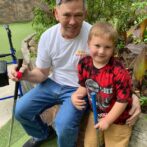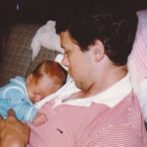Snapshots of Dementia: Life Is Hard
(Hans Peter Gauster, Unsplash) Life is hard, and it might not get easier.” Every one of our children knows this phrase well. While growing up, they often heard it from their dad (and eventually from each other as well as from me). It entered our lives as a line in an Amy Grant song, “We Believe in God.” Tom is living this reality now. Life with dementia is increasingly hard, especially in this year that has seen a steeper decline in his cognition and abilities. “What’s the hardest thing about living with dementia?” I asked him this morning. He had just misplaced his coffee mug and needed my help to find it, so although he hesitated, he had an answer. “Well, two things. First, I can’t remember where stuff is.” “Second …,” He gave one of his now-characteristic lengthy pauses, and after a couple of minutes had passed, I reminded him of the question. “Well, second (another long pause) … I’m sorry, I don’t remember.” “That’s OK, baby, I was just wondering what you thought. Is there something that really bothers you about having dementia?” “(Long pause) “If I think of something later, I’ll let you know.” I recently had to fill out a survey for an upcoming doctor’s appointment Tom has with the Brain Clinic at Emory University. It had to do with activities of daily living, a term health care professionals used to describe an individual’s daily self-care activities. I’ve filled out this survey before (Tom hasn’t been able to answer any medical questions on his own since 2018), but this time, I noticed that in more categories than ever before, I answered either “does not perform” or “cannot perform without help.” The ADL questions referred to such activities as fixing meals, driving a car, and keeping track of medication. Tom can’t do any of those activities, and for most of the remaining ones on the list, he requires a lot of assistance. What the questionnaire doesn’t reveal is how much assistance he needs. Although pet care wasn’t on the list, he needs more and more help in caring for his beloved box turtles. Last year, he could go out to our backyard pen and feed them on his own. This year, I go with him. He might forget that he’s not supposed to climb into the pen, which poses a fall risk. He might forget why he’s out there, and I remind him to give the turtles their food, which I’ve helped prepare. And of course without my reminders, he would forget that he needed to feed the turtles at all. Other ways his life has become harder as his brain change becomes more marked include: ...
Read More







